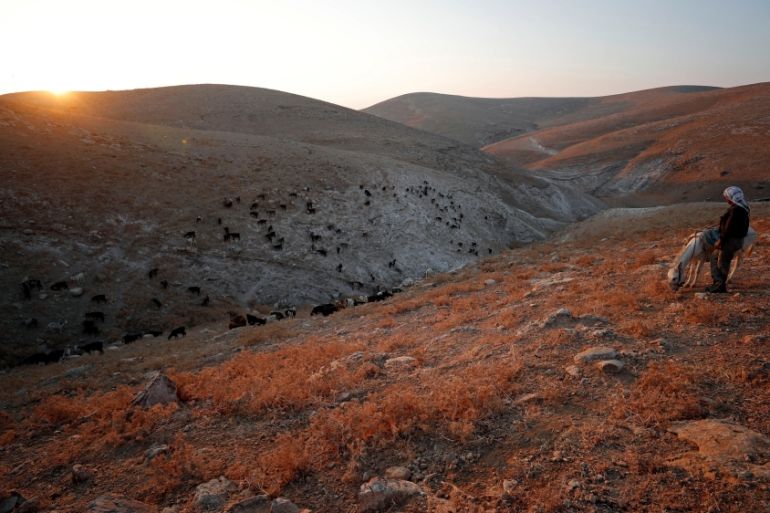Israel creates seven ‘nature reserves’ in occupied West Bank
Palestinian Authority says it will file complaints over Israel’s ‘dangerous announcement’ at UN, international courts.

Israel’s defence minister has announced the creation of seven nature reserves in the occupied West Bank as part of efforts to maintain Israeli control of the area, saying the move would strengthen Israel and further develop Jewish settlements.
The sites are all located in what is known as Area C of the West Bank that includes the strategic Jordan Valley, which Prime Minister Benjamin Netanyahu said in September he planned to annex.
Keep reading
list of 4 itemsPalestinian life under Israeli occupation: An illustrated guideThis article will be opened in a new browser window
The Take: The US funding behind illegal Jewish settlements in the West Bank
Israelis killing Palestinians ‘in cold blood’ in occupied West Bank
-
Palestinians in Jordan Valley: ‘Our lands are already annexed’
-
Netanyahu announces post-election plan to annex Jordan Valley
Minister of Defense Naftali Bennett, whose right-wing New Right party draws much of its support from Jewish settlers, said last week that the territory belonged to Israel and his goal was to annex it “within a short time”.
In his latest move, Bennett said the Israeli-run reserves would be “under the responsibility” of Israel’s Nature and Parks Authority.
He also announced the expansion of 12 existing West Bank sites managed by the Israeli authority, including Qumran, where the Dead Sea Scrolls were discovered in caves between 1947 and 1956.
According to the Ministry of Defense, it would be the first time the reserves have expanded since the Oslo Accords in the early 1990s.
Bennett is seeking re-election in the March 2 elections, as part of a far-right alliance.
The Palestinian Authority (PA) condemned the move, accusing Bennett of “erecting a new colonial umbrella to fight the Palestinian presence in those areas”.
Area C makes up 60 percent of the West Bank and is under full Israeli control.
The Palestinian foreign ministry said it would lodge complaints about the “dangerous announcement” at the United Nations and in international courts.
“The reserves will speed up his appearance before the ICC as a war criminal,” the ministry said in a statement, referring to Bennett.
‘Easier to evict Palestinians’
According to Israeli settlement watchdog Peace Now, the designated reserves total about 5,300 hectares (13,096 acres), some 40 percent of it under private Palestinian ownership.
Under Israel laws regulating nature reserves, Palestinians would be forbidden to cultivate their own land, the Peace Now’s Hagit Ofran said.
“If it’s a nature reserve, then you can uproot their trees and tell them they need a special permit for any agricultural activity,” she told AFP news agency. “It will be easier now to evict Palestinians from there.”
Most of the international community consider settlements on occupied Palestinian land to be illegal.
In 2016, the UN Security Council demanded a complete stop to the building of settlements and passed a resolution designating them a violation of international law and a major obstacle to peace in the Middle East.
Washington, however, bucked the consensus in November when Secretary of State Mike Pompeo said settlements were “not, per se, inconsistent with international law”.
Israel occupied the West Bank, Gaza Strip, part of the Golan Heights and East Jerusalem in the 1967 Six-Day War. More than 600,000 Israeli settlers now live in the occupied territories of the West Bank and East Jerusalem .